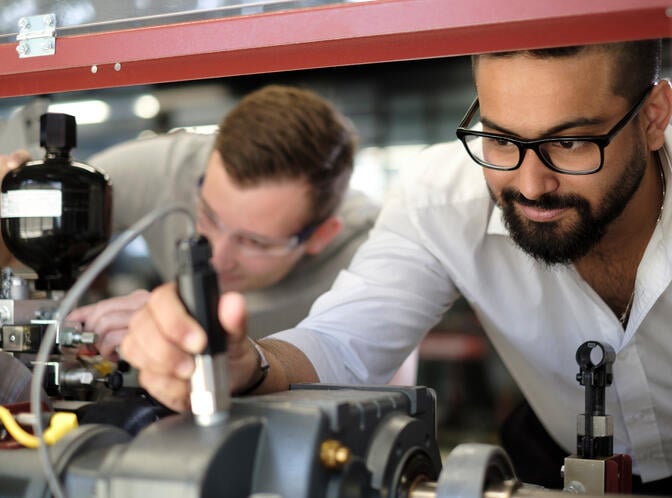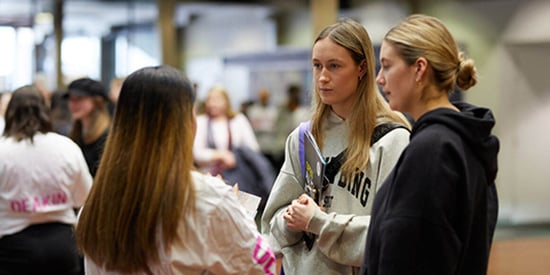Key facts
Duration
Locations
Key dates
Direct applications to Deakin for Trimester 2 2024 close 23 June 2024
Direct applications to Deakin for Trimester 3 2024 close 27 October 2024
Current Deakin Students
To access your official course details for the year you started your degree, please visit the handbook
Course overview
Study the Master of Engineering (Professional) and you’ll develop technical skills, a positive approach to problem solving and the ability to work as part of a team, while focusing on practical experience and a supervised research or industry project that provides you with the advanced project management skills required to tackle complex, industry-focused problems head on.
Throughout the degree you will acquire advanced engineering skills and the forward-thinking, innovative and entrepreneurial skills employers are looking for, while strengthening and extending your understanding of engineering through the pursuit of specialised study in either Engineering Management, Mechanical Engineering Design, Electronics Engineering or Electrical and Renewable Energy Engineering – the choice is yours. You will have world-class facilities and equipment at your fingertips with access to the Centre for Advanced Design in Engineering Training (CADET) and the Geelong Technology Precinct (GTP) – home to the Institute for Frontier Materials (IFM), Centre for Intelligent Systems Research (CISR), CSIRO Materials Science and Engineering and the Australian Future Fibre Research and Innovation Centre.
Deakin’s Master of Engineering (Professional) partners with industry to provide you with practical work experience opportunities, the capacity to apply your skills to real-world problems and the opportunity to form professional networks prior to graduation.
Engineering offers an exciting future for your working life, with a huge demand for engineering graduates in Australia and internationally. Skilled engineers are needed across all sectors, opening up excellent career opportunities around the world.
Units in the course may include assessment hurdle requirements.
Read MoreCourse information
- Award granted
- Master of Engineering (Professional)
- Year
- 2018 course information
- Deakin code
- S751
- CRICOS code?
- 052600A
- Approval status
- This course is approved by the University under the Higher Education Standards Framework.
- Australian Qualifications Framework (AQF) recognition
The award conferred upon completion is recognised in the Australian Qualifications Framework at Level 9.
Course structure
To complete the Master of Engineering (Professional), students must attain 16 credit points. Most units (think of units as ‘subjects’) are equal to 1 credit point. So that means in order to gain 16 credit points, you’ll need to study 16 units (AKA ‘subjects’) over your entire degree. Most students choose to study 4 units per trimester, and usually undertake two trimesters each year.
The course comprises a total of 16 credit points, which must include the following:
- 6 core coursework units (totalling 8 credit points)
- Completion of STP710 Introduction to Work Placement (0 credit-point compulsory unit)
- Completion of SEE700 Safety Induction Program (0 credit-point compulsory unit)
- Completion of STP050 Academic Integrity (0-credit-point compulsory unit)
- one 4-credit point specialisation from the list below. You will be required to complete at least one specialised study as part of this course.
- 4 elective units (you can choose which ones to study)
Core
# Must have successfully completed STP710 Introduction to Work Placements (0 credit-point compulsory unit)
plus
A four credit point specialisation.
plus
four elective units at level 7 (across the University)
Electives
Select from a range of elective units offered across many courses. In some cases you may even be able to choose elective units from a completely different discipline area (subject to meeting unit requirements).
Intakes by location
The availability of a course varies across locations and intakes. This means that a course offered in Trimester 1 may not be offered in the same location for Trimester 2 or 3. Check each intake for up-to-date information on when and where you can commence your studies.
Additional course information
Students must have access to a suitable computer and a network connection. Information about the hardware and software requirements may be obtained from the School of Engineering, telephone 03 9244 6699.
Course duration - additional information
Course duration may be affected by delays in completing course requirements, such as accessing or completing work placements.
Mandatory student checks
Any unit which contains work integrated learning, a community placement or interaction with the community may require a police check, Working with Children Check or other check.
Workload
You can expect to participate in a range of teaching activities each week. This could include classes, seminars, practicals and online interaction. You can refer to the individual unit details in the course structure for more information. You will also need to study and complete assessment tasks in your own time.
Participation requirements
Placement can occur at any time, including during the standard holiday breaks listed here: https://www.deakin.edu.au/courses/key-dates.
Elective units may be selected that include compulsory placements, work-based training, community-based learning or collaborative research training arrangements.
Reasonable adjustments to participation and other course requirements will be made for students with a disability. Click here for more information.
Work experience
You will have an opportunity to complete an engineering internship of 100-120 hours (typically as a 4-6 week unpaid placement or as a 12 week unpaid placement) in an Engineering-related position.
Entry requirements
FEE-HELP calculator
What is FEE-HELP?
FEE-HELP loans cover up to 100% of tuition fees for eligible students. By taking out a FEE-HELP loan, the government pays your tuition fees directly to Deakin, and the balance is repaid from your employment income - but only once you're earning over $51,550.
Please note: fees shown by the calculator are indicative only and based on 2024 rates. Actual fees may vary. We advise confirming fees with Prospective Student Enquiries prior to enrolment.
Estimate your FEE-HELP
FEE-HELP payments
per pay cycle
Take-home pay
after FEE-HELP and tax
per pay cycle
Your estimated FEE-HELP repayments
- $* is the estimated full cost for a Master of Engineering (Professional) (16 credit points), based on the 2024 fees.
- is the annual FEE-HELP payment, based on your current salary
- of your current salary be spent on FEE-HELP
*Disclaimer
Deakin University (Deakin):
- gives no warranty and accepts no responsibility for the currency, accuracy or the completeness of the information provided;
- advises users that no reliance should be placed upon on the information provided, and;
- instructs users that they should confirm the actual course fee with Prospective Student Enquiries prior to enrolment.
This tool provides indicative information about the fees that will be payable in respect of courses and subjects offered to prospective students domiciled in Australia during the periods indicated.
Please note that the fees shown by the calculator are indicative only and actual fees may vary. Users are advised to confirm the actual course fee with Prospective Student Enquiries prior to enrolment.
The estimated course fee is based on the tuition fee costs applicable to a domestic full time student commencing the course in Trimester 1 and studying full time for the duration of the course but:
- does not include non-tuition costs that may apply, such as Student Services and Amenities Fees (SSAF);
- does not take into account any scholarships or bursaries awarded to the student (including the 10% Deakin alumni discount);
- assumes the maximum number of units that need to be successfully completed actual number completed may be reduced if recognition of prior learning is granted;
- assumes that no exceptional, or non-typical, circumstances apply to the proposed course of study;
- assumes that the options that the user selects are appropriate for the course of study that they intend to undertake;
- where fees are estimated for future years those fee will be subject to annual increases in accordance with increases in the cost of course delivery.
Scholarship options
A Deakin scholarship might change your life. If you've got something special to offer Deakin – or you just need the financial help to get you here – we may have a scholarship opportunity for you.
Postgraduate bursary
If you’re a Deakin alumnus commencing a postgraduate award course, you may be eligible to receive a 10% reduction per unit on your enrolment fees.
Apply now
Some of our courses have limited places available - for the latest on courses still open for application, visit Courses by trimester.
Create an account in the Deakin Application Portal, start your application, enter personal details, education experience, upload supporting documents and submit. Need help? Play this video, or contact one of our friendly future student advisers on 1800 693 888 or submit an online enquiry.
For more information on the application process and closing dates, see the How to apply webpage. If you're still having problems, please contact us for assistance.
Entry pathways
Alternative exits
- Graduate Certificate of Engineering (S550)
Contact information
Faculty of Science, Engineering and Built Environment
School of Engineering
Tel 03 9244 6699
sebe@deakin.edu.au
Careers
Career outcomes
With strong demand for professional engineers continuing to increase, engineering graduates can be selective about the location and type of employer they want to work for. Employers are looking for graduates who are fully equipped with advanced engineering skills and capable of starting work projects immediately. Graduates of this course may find career opportunities in a wide range of industries associated with their study area producing job-ready graduates that industry is looking for.
Course learning outcomes
Deakin's graduate learning outcomes describe the knowledge and capabilities graduates can demonstrate at the completion of their course. These outcomes mean that regardless of the Deakin course you undertake, you can rest assured your degree will teach you the skills and professional attributes that employers value. They'll set you up to learn and work effectively in the future.
| Deakin Graduate Learning Outcomes | Course Learning Outcomes |
| Discipline-specific knowledge and capabilities | Apply specialised, integrated and practical knowledge of engineering principles in the design and analysis of systems and/or processes. Apply advanced and specialised knowledge of contextual factors that impact on engineering including Innovation, Sustainability, Leadership and Project management. Apply advanced and in-depth knowledge of current research directions and methodologies within an engineering specialisation. |
| Communication | Communicate effectively and professionally in a range of contexts using oral, written, graphical and interpersonal communication to professional, non-professional audiences. |
| Digital literacy | Locate, select, analyse, apply, evaluate, and disseminate both technical and non-technical information utilising a range of digital technologies and information sources. Use specialised engineering tools and technologies to communicate ideas, concepts, and designs. |
| Critical thinking | Apply critical and analytical thinking and judgment to complete engineering projects through design-based learning activities. Reflect critically on the theory and professional practice or scholarship of Engineering. |
| Problem solving | Apply design-based methodologies and creative and innovative approaches to solve problems in the context of research-based or professional engineering projects. |
| Self-management | Demonstrate self-management through professional and ethical conduct, and apply the principles of lifelong learning to new challenges. |
| Teamwork | Work effectively in teams and demonstrate team leadership in a collaborative learning environment with others from different disciplines and backgrounds. |
| Global citizenship | Manage technical, economic, social and ethical aspects of global engineering problems and projects in sustainable and culturally sensitive ways. |
Approved by Faculty Board 27 July 2017




